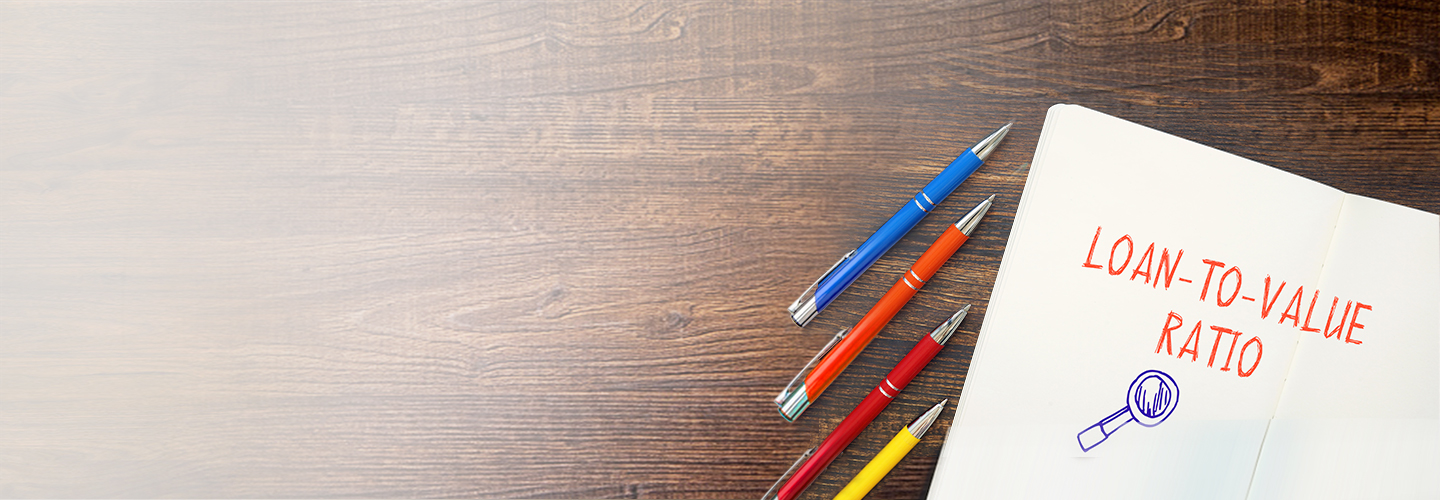Applying for a Loan Against Property offers you substantial funds without end-use restrictions. The funds available majorly depend on the LTV offered by the lender. Wondering what is LTV? The loan-to-value ratio, or LTV, is a crucial determinant of the total loan amount you can borrow from a lender against the property kept as collateral. LTV calculation is essential for both borrowers and lenders. Read on to have a vivid understanding of the concept of LTV for Loan Against Property and its calculation.
What is a Loan Against Property?

When a borrower takes a Loan Against Property, they offer their property as collateral to the lender. However, the borrower remains the rightful owner of the mortgaged property and can continue to use it as long as they repay the loan amount in full. Once the entire loan amount is repaid, the lender releases the mortgage on the property, and the borrower regains full ownership of it.
What is Loan-to-Value?
LTV for Loan Against Property is the maximum loan amount you can
borrow against the current market value of the property you're
mortgaging. Generally, in the case of Loan Against Property, the
loan-to-value ratio falls between 40-75% of the mortgaged property's
market value. However, some lenders even offer up to 90% financing to
get an edge over their competitors.
Before approving a Loan
Against Property, lenders assess the LTV ratio. This helps them to
avoid ending up lending an amount higher than the actual price of the
property. So, a higher LTV may discourage your lender from lending you
the money, whereas, you can access better loan terms with competitive
LAP interest rates with a lower LTV ratio.
How to Calculate the Loan-to-value Ratio?
You can calculate LTV for Loan Against Property manually in 2 simple steps. Read below to learn how:
- Step 1: Divide the amount you have borrowed or the principal loan amount by the market value of the mortgaged property.
- Step 2: Multiply the result of step 1 with 100, and the LTV ratio will come in %.
Therefore, LTV ratio (%) = (Amount borrowed/value of property) X 100
Illustration to Calculate Loan-to-Value Ratio
If the market value of your mortgaged property is ?1 Crore and the Loan-to-Value Ratio is 60%, the principal loan amount will be ?60 Lakh (60/100 X ?1 Crore).
How to Calculate Loan-to-Value Ratio with LTV Calculator?
LTV Calculator is an online tool that determines the ratio of the amount you are eligible to borrow against the appraised property value. Follow the 3 steps below to calculate your property's LTV more simply and easily:
- Step 1: Click on the “LTV Calculator”, and select the property type.
- Step 2: Enter the estimated market value of the property you are planning to keep as collateral.
- Step 3: Click on “Calculate” and you can check the maximum loan amount obtainable against the value of your property.
ALSO READ :- How to Avail Loan Against Residential Property?
4 Factors That Impact the Loan-to-Value Ratio
While a higher LTV ratio results in a lower loan amount or higher
rates of interest, a lower LTV increases your loan approval chances.
So read the points below to understand what factors you should
consider before applying for a Loan Against Property:
1.
Property Type
The applicable LTV for LAP depends on
the type of property being financed. Lenders may apply different LTV
requirements for residential areas, commercial or investment
properties based on the risk factors associated with each property
type.
2. Value of the Property
The LTV
ratio is directly impacted by the appraised value of the mortgaged
property. A higher property value leads to a lower LTV ratio. It
ensures quicker loan approval and better loan terms and interest
rates.
3. Down Payment
LTV for Loan
Against Property also depends on the size of the down payment made
by you. The amount of down payment you make will have an inverse
impact on the LTV ratio offered by your lender. A larger down
payment means that the loan amount is reduced, resulting in a lower
LTV ratio.
4. Borrower’s Creditworthiness
One of the other crucial factors that impact the LTV ratio is
your creditworthiness. The better your credit score is, the higher
will be the LTV ratio. An excellent CIBIL score of 800-900
reflects the credibility of your financial portfolio and. demonstrates
your ability to repay loans on time. So, with a strong credit score,
you may end up getting favourable loan terms.
The Importance of Loan-to-Value Ratio
LTV for Loan Against Property is an essential metric in the
financing industry that impacts both lenders and borrowers. Each party
assesses the LTV ratio against a mortgaged property to estimate the
risks or favourable terms involved with the financing option. The
reasons why the LTV ratio is crucial to consider while you apply for a Loan
Against Property include:
1. Assessment of
Risk
Lenders use the loan-to-value ratio to estimate
the risks associated with providing you with the funding. A higher
LTV suggests that the borrower has less equity in his property,
increasing the chances of defaulting on the loan. In that case,
lenders may reject your application.
2. Loan
Approval
The LTV ratio is a determining factor for
lenders when it comes to approving your loan application. Lenders
view lower LTV ratios favourably, as it suggests that the borrower
has more equity in their property and the risk of defaulting is
less. This may help to increase your chances of loan approval.
3. Interest Rates and Loan Terms
You can
qualify for favourable loan terms and lower interest rates with
lower LTV ratios. That is because the associated risks for lenders
are low. However, with higher LTV ratios, lenders may increase the
interest rates or charge additional fees to waive the risk involved.
How to Apply for a Loan Against Property with Poonawalla Fincorp?
With simple documentation and straightforward eligibility criteria, you can apply for a Loan Against Property in just 5 minutes with Poonawalla Fincorp. Follow the steps below to apply for a seamless online application:
- Step 1: Click on the ‘Apply Now’ button and you will be redirected to the application form.
- Step 2: Provide essential details such as your name, DOB, PAN number, employment details, property type and property ownership details.
- Step 3: Review the provided information to avoid any mistakes, and click on ‘Submit’ to complete the application process.
Things to Keep in Mind About LTV Ratio When Applying for a Loan
When applying for a Loan Against Property with a certain LTV ratio, it is important to consider certain factors to experience a seamless loan approval. Read the following points to understand what you should keep in mind before applying for a loan:
- Find out the appraised value of your property by appointing a professional appraiser to know the loan amount you are eligible for.
- A higher credit profile ensures a lower LTV ratio, increasing your chances of loan approval.
- Try to pay a higher down payment to demonstrate your financial stability, and you may be offered the best loan terms and interest rates.
- Maintaining a lower debt-to-income ratio can positively impact your credit score, so you can qualify for lower LTV for Loan Against Property.
To Conclude
While a lower LTV for a Loan Against Property is considered favourable by lenders, your borrowing power decreases, and you are required to pay a larger down payment. However, this is an opportunity for you to strengthen your financial position by availing of lower monthly payments. Hence, you can repay on time without defaulting, significantly improving your credit score. With Poonawalla Fincorp, you can get access to a flexible repayment tenure and competitive interest rates.
Frequently Asked Questions About Loan to Value Ratio
1. Does the age of the property affect the LTV
ratio?
Yes, newer properties are likely to get a
higher LTV than the older ones.
2. How to improve my
creditworthiness?
You can improve your
creditworthiness by repaying loans earlier, limiting your credit
utilisation ratio, and maintaining a lower debt-to-income
ratio.
3. Can I determine the appraised value of
my property?
While you can, it is always preferable
to appoint a professional to perform the calculation for credibility
and accuracy.
We take utmost care to provide information based on internal data and reliable sources. However, this article and associated web pages provide generic information for reference purposes only. Readers must make an informed decision by reviewing the products offered and the terms and conditions. Loan disbursal is at the sole discretion of Poonawalla Fincorp.
*Terms and Conditions apply